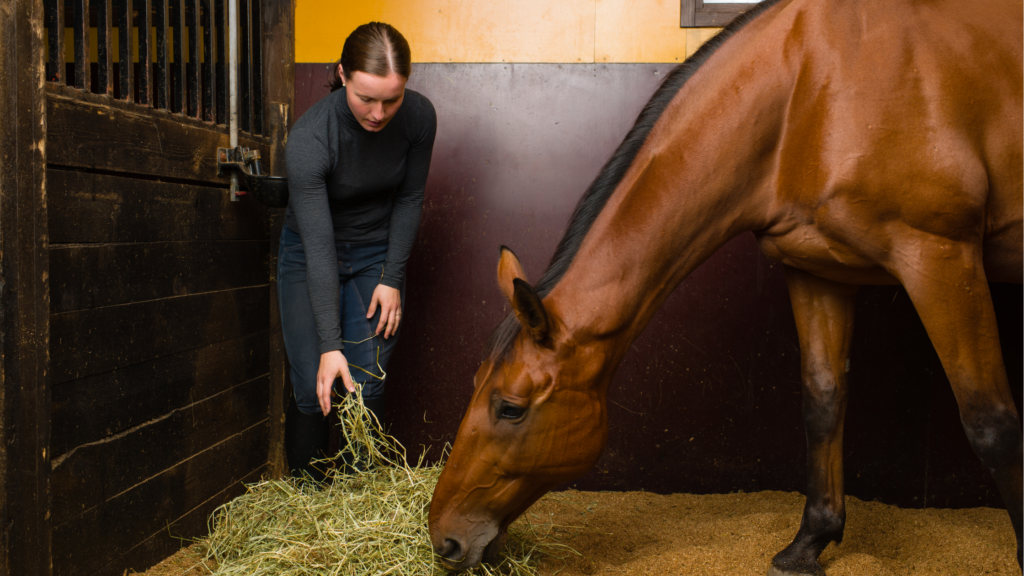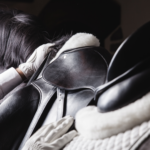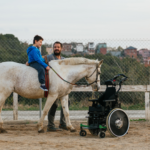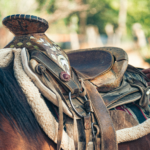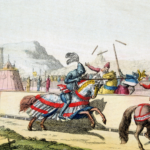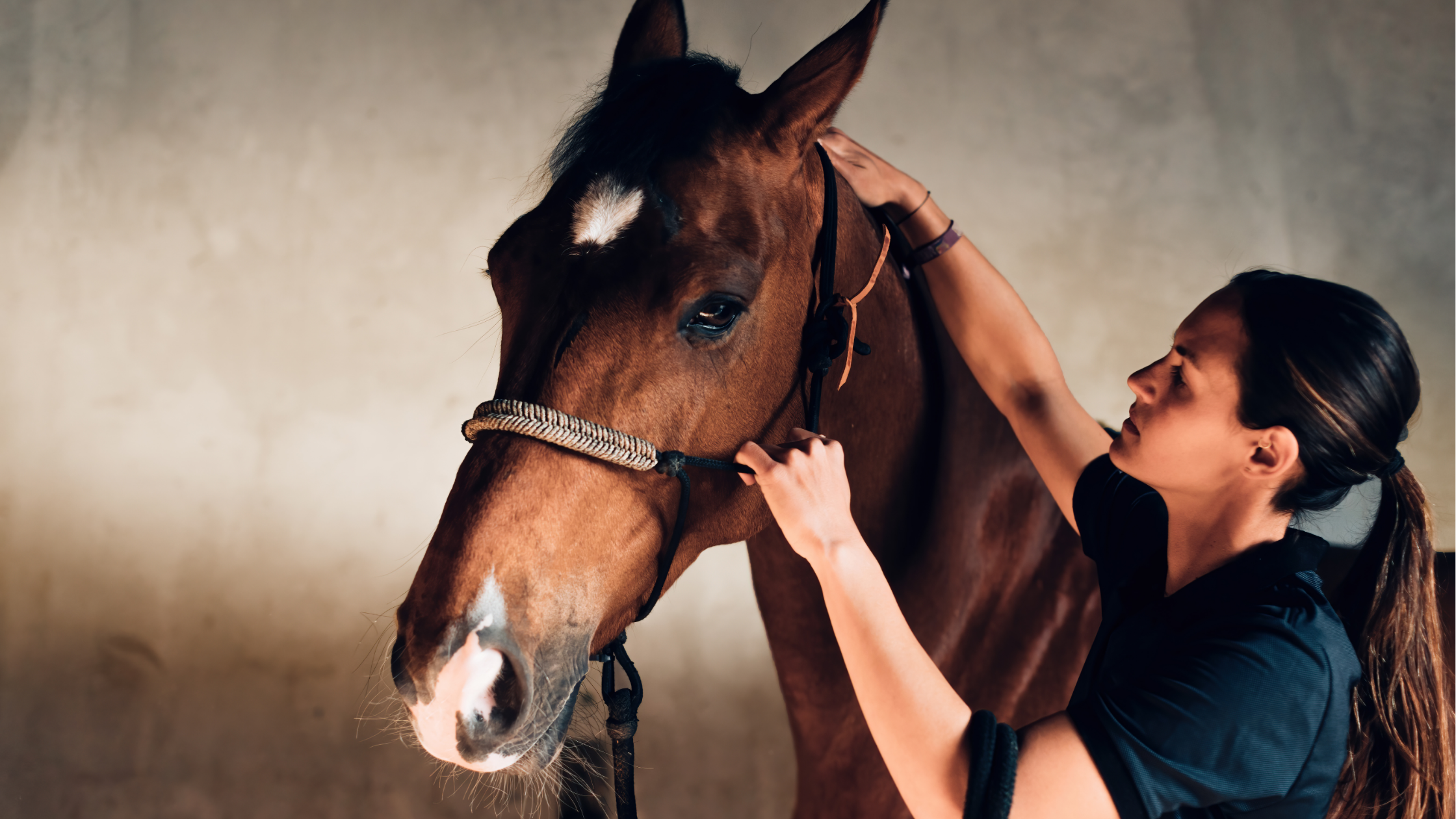
Owning a horse implies a great responsibility, not only because of its size and strength, but also because they are sensitive animals dependent on constant care. Your horse's well-being is directly reflected in its behavior, performance and longevity. At Deluxe HorseWe offer classes and services related to the equestrian world, and part of our mission is to educate owners on how to properly care for their horses to ensure a long and happy life.
This article will provide you with a complete guide with the most important tips to ensure the proper care of your horse, from feeding to its mental and emotional health.
Proper Feeding: The Basis of your Horse's Well-being.
a) A balanced diet is key
Nutrition is essential to keep a horse healthy and in good physical condition. Their diet should be composed primarily of high quality forage, such as hay or fresh grass. Forage provides fiber, which is essential for the horse's digestive system, helping to prevent problems such as colic.
An average adult horse consumes approximately 1.5-2% of its body weight in forage per day, which equates to 9-12 kg of hay for a 600 kg horse. Make sure the hay is fresh, free of dust and mold, and if your horse has access to pasture, make sure it is not overgrazed.
b) Nutritional supplements
Depending on the horse's physical activity and state of health, it may be necessary to supplement its diet with concentrates, such as grains or nutritional supplements. Concentrates are important for horses that are in intense training or competitions, as they provide them with the extra calories they need.
However, it is important not to overfeed your horse with grains, as this can lead to problems with obesity or colic. Always consult with a veterinarian or equine nutritionist before modifying your horse's diet.
c) Fresh, clean water
Constant access to clean water is vital. A horse can drink between 20 and 55 liters of water per day, depending on the weather, physical activity and diet. Make sure the water is always clean and that water troughs are disinfected regularly to avoid bacterial build-up.
Coat and Skin Care: Keep your Horse Clean and Relaxed.
a) Daily brushing
Brushing your horse daily not only keeps his coat shiny and clean, but is also an opportunity to strengthen your bond with him. Brushing removes dust, dirt and dead hairs, as well as stimulates blood circulation and distributes the natural skin oils that keep the coat healthy.
A good grooming kit should include a stiff brush, a soft brush, a mane rake and a soft sponge or cloth to clean sensitive areas such as the eyes and muzzle.
b) Occasional baths
Although it is not necessary to bathe a horse frequently, an occasional bath can be helpful, especially after an intense work session or during the warmer months. Be sure to use horse-specific shampoos, as products designed for humans can irritate their skin.
You should always dry your horse well after bathing, avoiding leaving it wet for a long time, as this can cause skin irritations or infections.
c) Mane and tail care
The mane and tail require special care. Combing and detangling these areas with a wide-toothed comb is essential to prevent knots from forming. You can also apply oils or specific detangling products for horses, which will help keep the mane and tail soft and shiny.
Hoof Care: Keep your Horse in Motion.
a) Daily cleaning of the hulls
The hooves are an essential part of the horse, as they support all its weight and are in constant contact with the ground. It is important to clean them daily to remove any stones, dirt or debris that can cause infections or pain.
Use a hoof pick (hoof cleaning tool) to remove dirt from the inside of the hoof, paying special attention to the frog grooves (the soft part of the hoof). Also, make sure the hooves are dry, as excessive moisture can weaken them and make them prone to infections such as frog rot.
b) Regular trimming of hulls
Hooves are constantly growing, and should be trimmed every 4 to 6 weeks by a professional farrier. Misalignment or overgrowth of hooves can cause mobility problems and pain in the horse's joints. The farrier should also check if shoeing is necessary, especially if the horse is working on hard surfaces.
c) Horseshoes
Horseshoes protect hooves from wear and tear, especially in horses working on rocky or hard terrain. However, not all horses need them, as some horses that live in natural conditions can maintain strong hooves without shoes. The decision to shoe your horse should be made in consultation with a trusted farrier.
Exercise and Daily Work: Key to Your Physical and Mental Health.
a) Consistent exercise routine
Horses need regular exercise to stay fit and healthy. The type of exercise will depend on the horse's age, breed and level of training, but a daily walk, whether ridden or at liberty, is essential to maintain their physical and mental well-being. Exercise helps prevent obesity, keep joints in good condition and improve circulation.
If your horse is in training or competition, it is important to follow a structured exercise plan, varying between endurance, strength and flexibility work. In addition, rest days are essential to avoid overtraining.
b) Field trips
Allowing your horse to spend time outdoors is critical to their mental health. Grazing and socializing with other horses are natural activities that allow them to relax and behave in a more balanced way. If your horse spends a lot of time in a stall, it is important to give him quality time outside his stall so he can move freely and enjoy the fresh air.
Veterinary Checkups and Preventive Care.
a) Regular veterinary visits
Like humans, horses require regular medical check-ups. Visits to the veterinarian should include checking teeth, eyes, general health, vaccinations and deworming.
Common vaccinations for horses include those against equine influenza, tetanus and equine encephalitis. Maintaining an up-to-date vaccination schedule is crucial to prevent serious diseases.
b) Periodic deworming
Horses are exposed to a variety of parasites that can affect their digestive system and general health. Veterinarians recommend a regular deworming program, which should be adapted to the specific conditions of the horse's living environment and diet.
Emotional and Mental Care: Strengthen the Bond with your Horse.
a) Positive daily interaction
Horses are highly social animals that thrive on human interaction. Spending time with your horse outside of training sessions, simply petting, walking or giving treats, strengthens the bond between the two of you and keeps him emotionally balanced.
b) Quiet and safe environment
The environment where your horse lives directly influences its mental well-being. A clean, spacious and well-ventilated stable is essential to avoid stress. In addition, if the horse is stabled most of the day, providing toys or enrichment time can help prevent boredom.
Caring for a horse is a long-term commitment that requires constant attention, but the results are enormously rewarding. At Deluxe HorseWe offer services and advice to ensure that you and your horse enjoy a healthy and balanced relationship. Whether you are looking to improve your grooming technique or need expert advice, we are here to support you every step of the way.
